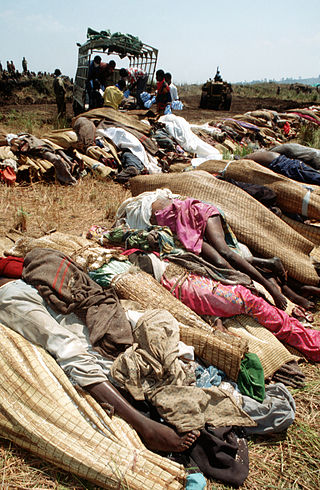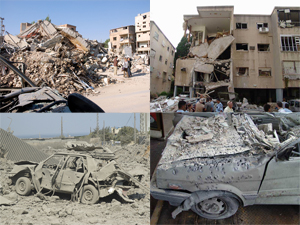International human rights law (IHRL) is the body of international law designed to promote human rights on social, regional, and domestic levels. As a form of international law, international human rights law is primarily made up of treaties, agreements between sovereign states intended to have binding legal effect between the parties that have agreed to them; and customary international law. Other international human rights instruments, while not legally binding, contribute to the implementation, understanding and development of international human rights law and have been recognized as a source of political obligation.

United Nations Security Council Resolution 1706, adopted on August 31, 2006, after recalling previous resolutions on the situation in Sudan, including resolutions 1556 (2004), 1564 (2005), 1574 (2004), 1590 (2004), 1591 (2005), 1593 (2004), 1663 (2006), 1665 (2006) and 1679 (2006), the Council expanded the mandate of the United Nations Mission in the Sudan (UNMIS) to include deployments in Darfur to enforce the Darfur Peace Agreement.

United Nations Security Council Resolution 1674, adopted unanimously on April 28, 2006, after reaffirming resolutions 1265 (1999) and 1296 (2000) concerning the protection of civilians in armed conflict and Resolution 1631 (2005) on co-operation between the United Nations and regional organisations, the Council stressed a comprehensive approach to the prevention of armed conflict and its recurrence.

United Nations Security Council resolution 866, adopted unanimously on 22 September 1993, after reaffirming resolutions 813 (1993) and 856 (1993), the council noted that United Nations involvement would contribute significantly to the effective implementation of the peace agreement in Liberia and went on to establish the United Nations Observer Mission in Liberia (UNOMIL).

United Nations Security Council resolution 897, adopted unanimously on 4 February 1994, after reaffirming resolutions 733 (1992) and 886 (1992) and all of its subsequent resolutions on Somalia, the Council discussed the role of the United Nations Operation in Somalia II in the peace process in the country.

United Nations Security Council resolution 925, adopted unanimously on 8 June 1994, after reaffirming all resolutions on the situation in Rwanda, particularly resolutions 912 (1994) and 918 (1994), and Resolution 868 (1993) on the safety of United Nations peacekeepers, the council deployed additional battalions and extended the mandate of the United Nations Assistance Mission for Rwanda (UNAMIR) until 9 December 1994.

United Nations Security Council resolution 1078, adopted unanimously on 9 November 1996, after expressing concern at the situation in the African Great Lakes region, the Council discussed proposals for a regional conference on security and a multinational humanitarian force in eastern Zaire.

United Nations Security Council resolution 1097, adopted unanimously on 18 February 1997, after expressing concern over the situation in the African Great Lakes region and for the safety of refugees and displaced persons, the Council endorsed a five-point peace plan to address the situation in eastern Zaire.

United Nations Security Council resolution 1170, adopted unanimously on 27 May 1998, after considering the situation across the African continent, the Council decided to establish an ad hoc Working Group to review the Secretary-General Kofi Annan's recommendations concerning the maintenance of international peace and security in Africa.

United Nations Security Council resolution 1197, adopted unanimously on 18 September 1998, after reaffirming its primary responsibility to maintain international peace and security, the Council addressed co-operation efforts with the Organisation of African Unity (OAU).

United Nations Security Council resolution 1209, adopted unanimously on 19 November 1998, after recalling resolutions 1170 (1998) and 1196 (1998) on Africa, the Council addressed illicit arms flows on the continent.

United Nations Security Council resolution 1226, adopted unanimously on 29 January 1999, after reaffirming Resolution 1177 (1998) on the situation between Eritrea and Ethiopia, the Council strongly urged Eritrea to accept an agreement proposed by the Organisation of African Unity (OAU) to resolve the conflict between the two countries.

United Nations Security Council Resolution 1923 was adopted unanimously on 25 May 2010, after recalling resolutions 1769 (2007), 1778 (2007), 1834 (2008), 1861 (2009), 1913 (2010) and 1922 (2010). The Council extended the mandate of the United Nations Mission in the Central African Republic and Chad (MINURCAT) for a final time until 31 December 2010, with a complete withdrawal by that date.

United Nations Security Council resolution 1234, adopted unanimously on 9 April 1999, after expressing concern at the situation in the Democratic Republic of the Congo, the Council demanded an immediate halt to hostilities in the region, a withdrawal of foreign forces and the re-establishment of the government's authority.

United Nations Security Council resolution 1239, adopted on 14 May 1999, after recalling resolutions 1160 (1998), 1199 (1998) and 1203 (1998), the Council called for access for the United Nations and other humanitarian personnel operating in Kosovo to other parts of the Federal Republic of Yugoslavia.

United Nations Security Council resolution 1258, adopted unanimously on 6 August 1999, after reaffirming Resolution 1234 (1999) on situation in the Democratic Republic of the Congo, the Council authorised the deployment of military liaison personnel to the capitals of the signatories of the Lusaka Ceasefire Agreement.

United Nations Security Council resolution 1265, adopted unanimously on 17 September 1999, in the first resolution to address the topic, the council discussed the protection of civilians during armed conflict.

United Nations Security Council resolution 1297 was adopted unanimously on 12 May 2000, after reaffirming resolutions 1177 (1998), 1226 (1999) and 1227 (1999) on the situation between Eritrea and Ethiopia. The Council demanded an immediate end to hostilities between the two countries.

United Nations Security Council resolution 1366, adopted unanimously on 30 August 2001, after reaffirming resolutions 1196 (1998), 1197 (1998), 1208 (1998), 1265 (1999), 1296 (1999), 1318 (2000), 1325 (2000) and 1327 (2000) concerning aspects of armed conflict, the Council reiterated its aim to prevent armed conflict as part of its responsibility to maintain international peace and security.
United Nations Security Council Resolution 1935, adopted unanimously on July 30, 2010, after reaffirming all previous resolutions and statements on the situation in Sudan, the Council extended the mandate of the African Union – United Nations Hybrid Operation in Darfur (UNAMID) for a further 12 months until July 31, 2011 and demanded an end to fighting and attacks on United Nations personnel and civilians.


















